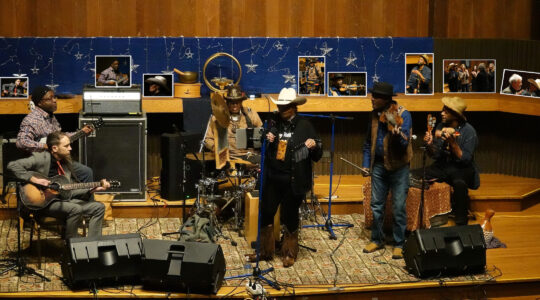How did it go in that speech? Folks in red states who hate eavesdropping, folks in blue states who believe in an awesome God?
Add to that folks in pro-Israel groups who want settlers in the farthest reaches of the West Bank and folks in, ummm. …. other pro-Israel groups who don’t.*
President-elect Barack Obama’s transition team’s first official encounter with the Jewish community suggested a substantial change in how his administration will deal with Jewish groups: Present were the array of dovish pro-Israel groups, including the Israel Policy Forum, J-Street, Americans for Peace Now and Brit Tzedek v’Shalom.
Of those groups, only IPF made the occasional appearance at meetings with Bush administration officials – and that was because the group has always been careful to cast a non-partisan tint to its pro-negotiations posture, effusively praising the Bush administration’s peace-brokering efforts, however infrequent those were until a year or so ago. Other more liberal groups at the table – including the Reform movemen’ts Religious Action Center – were also occasionally invited, but the emphasis is on "occasionally."
What was remarkable about Thursday’s meeting is that the Obama team also reached out to the other side, including the Zionist Organization of America. Dan Shapiro, the transition official who handled foreign policy at the meeting, made it clear he wanted to hear all voices.
The Bush administration’s infamous tetchiness at criticism seemed to be a thing of the past: ZOA has slammed Obama’s transition team for including strident Israel critic Samantha Power in a post that barely registers above chief cook and bottle washer, but has failed to praise it for installing true-blue pro-Israel types like Jim Steinberg in more senior posts.
And that was fine with the dovish types, or at least with Diane Balser who directs Brit Tzedek, a group that has lobbied in recent years for increased aid to the Palestinians, even as ZOA has lobbied against it.
"The Obama team said they were open and understood everyone had a seat," Balser told me. "To acknowledge there is more than one view on Israel, that we’re not monolithic – I consider that a step forward for us."
Balser was so enchanted by the new order, that she sought out the ZOA’s Mort Klein afterwards, and they had a civil, even pleasant conversation, she said, and discovered something in common (aside, of course, from a love for Israel, however differently slanted): Each, it turns out, has a sibling who thinks their politics are, well, nuts.
Klein confirmed the conversation. "I tell my brother he’s adopted, and he reminds me we look alike," he said.
Klein said he thought Balser "was delightful and pleasant, although her group’s views are not delightful and pleasant."
Klein wasn’t so sure about the breadth of the transition team’s outreach, noting that Americans for a Safe Israel, which is similarly hawkish, was not present – although he was not sure they were not invited.
Klein said he took the opportunity during the meeting to contradict some of the dovish groups’ positons, pointing out shortcomings in the Arab League’s peace plan (it is unclear, for instance, on the status of Palestinian refugees and leaves open the possibility of a mass return.)
He also said that he corrected misimpressions of support for a two-state solution, noting that at least two Israel parties in the Knesset are opposed – and that support among American Jews has dropped in recent years to less than 50 percent.
*The Red State/Blue State nexus doesn’t work here – Balser is from Boston and Klein is from Philadelphia.





